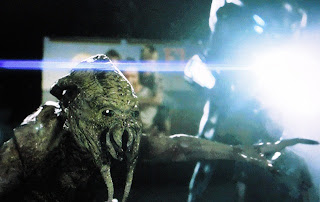I've just finished a good long look at The X-Files Season Two, a full, whopping 25 episodes long. How fitting a story connecting the FBI to Ufology should made headlines yesterday as I had just completed The X-Files, Season Two, Episode 25, season finale, Anasazi, which centers aspects tied to the very story making the news. Anyone interested in all things Ufological would no doubt find interest.
.jpg)

Anasazi centers on the story of a computer hacker called The Thinker who taps into secret U.S. Government files including the mythic MJ-12 file (Majestic 12; codename assigned to a secret committee of scientists, military and government officials under the authorship of President Harry S. Truman in 1947 following Roswell -Operation Majestic Twelve) and the events surrounding Roswell, New Mexico. Anasazi, suggesting the furtive group as an international collective, cleverly blurs the lines between fiction and non-fiction. It ties the science fiction realities of Agents Fox Mulder and Dana Scully and the events of The X-Files, Season Two, Episode 5, Duane Barry directly to these elusive files. Chris Carter was always masterful at weaving real life conspiracy mythology (?) with his own science fiction mythology and the events in yesterday's news are linked to the culmination of such ideas in the David Duchovny and Chris Cater-scripted Anasazi from Season Two.

So a one page memo, intriguingly connected to the often impenetrable world surrounding The X-Files, and Anasazi in particular, was released in April 2011 under the Freedom Of Information Act. The memo is dated March 22, 1950. The memo was directed to J. Edgar Hoover from a man named Guy Hottel, then head of the FBI field office in Washington D.C..

There's no shortage of myth and intrigue that surrounds the J. Edgar Hoover era. In Chris Carter's Millennium (1996-1999), Season Three, Episode 14, Matryoshka, the writers, Erin Maher and Kay Reindl (look for an outstanding interview with those writers in the wonderful publication Back To Frank Black: A Return To Chris Carter's Millennium (2012) available from Lulu), intelligently weave the idea that Hoover was in effect a member of the secret society that was The Millennium Group. Millennium directly tied the then director of the FBI, Hoover, to the mysterious group. The X-Files also explored its own mythology with Hoover directly linked to The X-Files, Season One, Episode 19, Shapes, when Fox Mulder suggests a similar case forty years earlier was in effect the first X-file opened by J. Edgar Hoover himself. The Hoover connection is indirectly explored further in The X-Files, Season Five, Episode 15, Travellers. Hoover was neck deep in it within the smartly-written confines of these wonderfully original sci-fi series at the hands of Chris Carter. Carter was so good at mythology-building it was sometimes difficult to determine what was truth and what was fiction, while remaining endlessly entertaining within a unique look and cinematography not revisited since the end of that impactful series.
.jpg)
So with The X-Files and Millennium directly linking the FBI to questionable and allegedly historical events, here we have the release of a memo with the subject header of FLYING SAUCER INFORMATION CONCERNING.
The memo reveals the recovery of three saucers 50 feet in diameter. An Air Force investigator indicated there was a recovery of "three bodies of human shape but only 3 feet tall, dressed in metallic cloth of a very fine texture." *// So why is the memo making news today? The FBI commented recently in a blog post that "The Hottel memo does not prove the existence of UFOs." The FBI noted the events in Roswell July 1947 took place three years prior to the memo. The FBI sees no connection and further remarked, "It is simply a second - or third-hand claim that we never investigated." Really? Wow. And the Federal government wonders why people are skeptical of its transparency. It's no surprise The X-Files was so overwhelmingly embraced for nine seasons.
.jpg)
The FBI noted, "The FBI has only occasionally been involved in investigating reports of UFOs and extraterrestrials. For a few years after the Roswell incident, Director Hoover did order his agents—the request of the Air Force—verify any UFO sightings. That practice ended in July 1950, four months after the Hottel memo, suggesting that our Washington Field Office didn't think enough of that flying saucer story to look into it." Incredible. The point here is do you believe? Like Mulder, I want to believe.
The latest update in the questions surrounding the world of Ufology merely serve to underscore the intelligence of Carter's series and its importance culturally. The government continues to control the flow of information just as The Cigarette-Smoking Man claimed throughout The X-Files. What do we know today? It's positively fascinating when creative people are able to integrate the political and cultural realities within science fiction as Carter managed so seamlessly and brilliantly with The X-Files and to know that over a decade on that that truth is absolutely still out there.
.jpg)
I had planned on spending some time on The X-Files Season Two this year and still do, but have placed that on hold to look more closely at Season One for both Fringe and Falling Skies. I'm not exactly sure how I want to approach The X-Files. It's massive in scale, scope, artistic integrity and sheer number of episodes. I have such immense respect for the series and anything else by Chris Carter I'll definitely take it season by season. The X-Files is definitely a series I look forward to spending some time on, whether in shorter posts or lengthier posts has yet to be determined.
.jpg)
.jpg)
.jpg)




































































